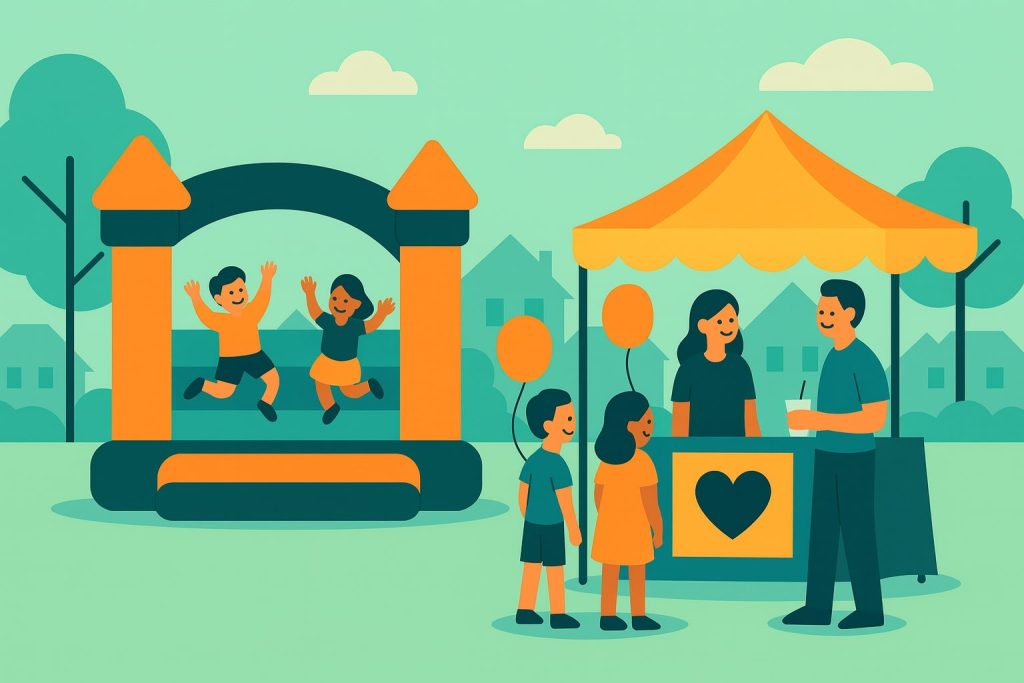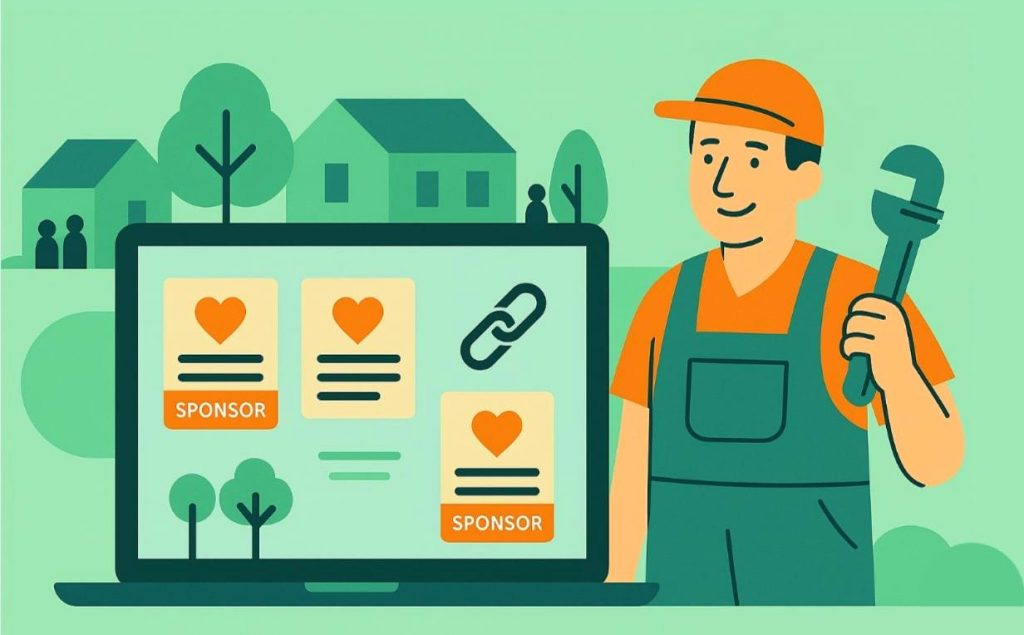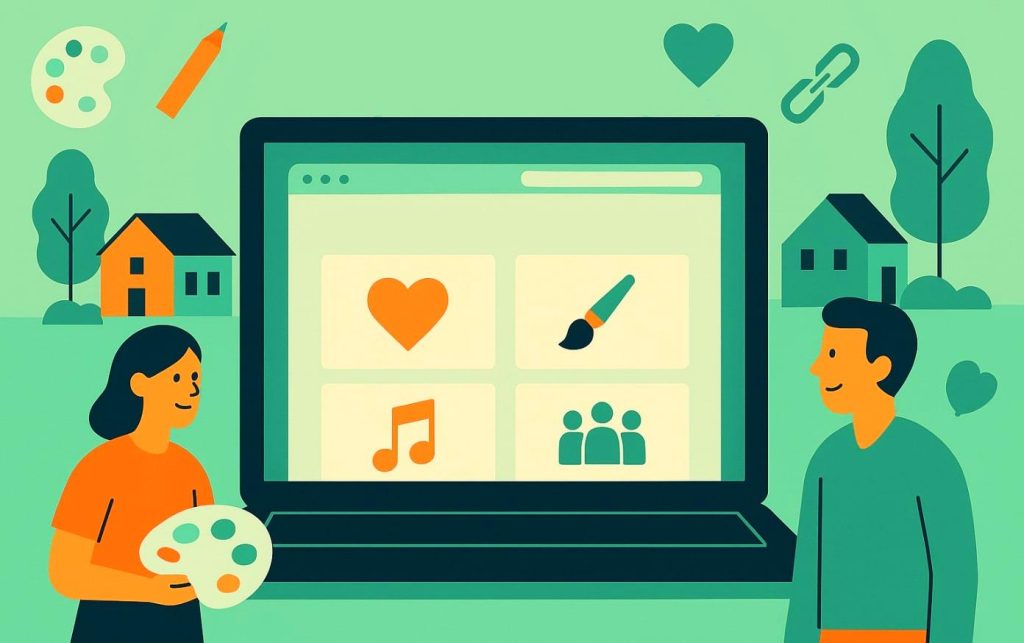The Zip episode 21
How much do you care that your flashlight app may be tracking your location? Do you know what a Beacon is, and why your favorite coffee chain has a slew of them? And when you hear the term Street Fight, do you think about brass knuckles?
Your answer to all of these questions probably depends on how embedded you are in the businesses of local marketing. In the past 10 or so years, much in thanks to mobile technology, hyperlocal has become an industry unto itself, and today, I’m excited to share my interview with one of this industry’s leading analysts.
In this episode, we’ll talk about the developments and the changes in the local marketing industry, how Facebook and Google may be taking over… pretty much everything, as well as David’s billion dollar app idea slash art project.
Welcome to The Zip – a podcast on the ecosystem of local. I’m Megan Hannay, and each week I speak with a local marketer, organizer or storyteller on their experiences and expertise, and on what makes their area unique.
Today is Wednesday, December 14th, 2016. And today I’m speaking with David Hirschman, co-founder and COO of Street Fight. Founded in 2010, Street Fight is a digital outlet focused on hyperlocal business and technology. Previously, David wrote for publications such as Wired and the New York Times.
So let’s jump in…

Megan: David, thank you so much. I’m really glad to have you out here on The Zip and it was great to meet and speak with you in person during the Street Fight conference a couple of weeks back.
Now, that is over, are you already prepping for the next Street Fight event?
David Hirschman: Yeah, we’re in the process of mapping out next year. I think we’ll make a few changes but we have a few things earlier in the year that we do and then we’ll definitely have Street Fights Summit again in New York in the fall. We’ve been doing this for almost six years now and so Laura and I are looking very closely on what we do and how we can make it better.
Megan: Very cool. Yeah and it was a great event
David: Thanks.
Megan: It’s great to meet a lot of people as well. Street Fight, for those who are listening and who don’t know is an online publication, founded by you, David Hirschman and Laura Rich back in 2011, I believe. While you’re a national magazine, your focused is as you call if the business of hyperlocal. How would you explain that title to someone who’s never heard of Street Fight?
David: I mean, on some level were all that anybody who connects local consumers with local businesses and also brands that are trying to connect with local consumers. It’s basically, we cover companies like Foursquare and Yup and Groupon and YP and Uber.
Those are the wide range of companies that do business on a local level and it’s not just do business sort of local technology, marketing and commerce so that also includes point of sales systems and anything kind of a local business would use to interact with customers.
Megan: Got it. Can you tell me a little about this origin of Street Fight? What turned it from something that was like, “This would be really neat to do.” This is like you’re saying like a lot those companies in Foursquare, like those were just developing back in 2011. What turned this from a that would neat to, “Yes absolutely, let’s start this.”
David: Sure. I mean, Laura and I were both kind of long-time business journalists and we’ve been working together in one way or another for about 10 years. Basically, whenever she had a staff job, she would give me freelance work and wherever I have a staff job, I give her freelance work and we developed a good working relationship.
Towards, I guess at the end of 2010, we both found that we’re really interested in local. It seems like newspaper has reduced and this generally had been by the internet and it was on this sort of long, slow and then fast decline.
There are all these companies coming up to kind of take market share that had been lost by that traditional media. The most obvious one in 2010 was the rise of Groupon. Groupon grew faster and bigger then like basically any company ever at that point.
Megan: Yeah, it’s huge.
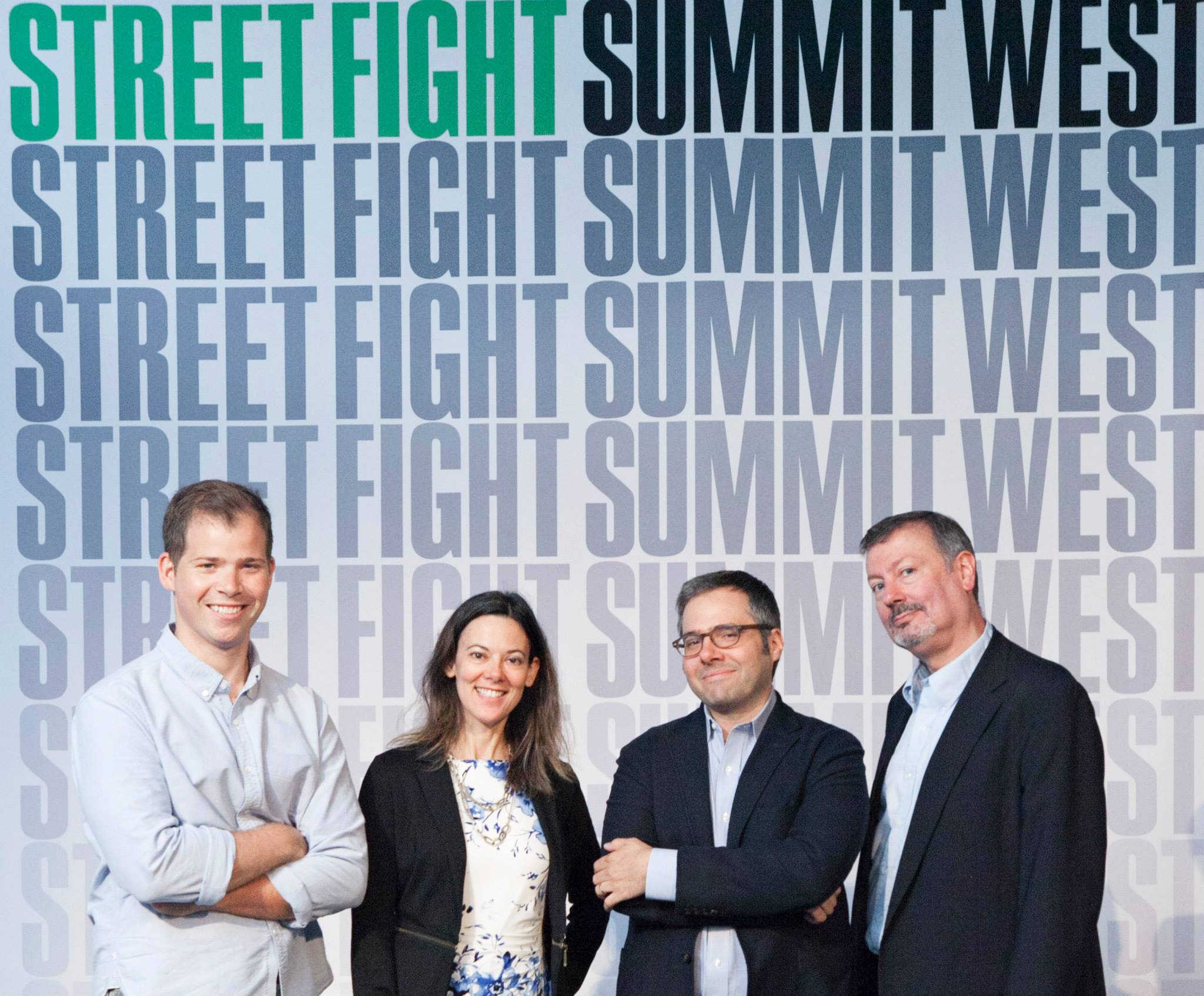 Street Fight team members Steven Jacobs, Laura Rich, David Hirschman and David Card at their 2015 summit.
Street Fight team members Steven Jacobs, Laura Rich, David Hirschman and David Card at their 2015 summit.
David: Yeah, and so watching that, I guess the name Street Fight really came about, because we were talking about how in a new industry or newly reforming industry, there’s always a struggle for market share as people come in with lots of startups and new ideas and ways to try to do something new. We saw this as a Street Fight between a lot of the companies that were popping in the space.
Megan: I like that.
David: That sort of borne out and the way that we’ve thought about Street Fight and what was covered is definitely changed over the years. When we first started, we were very heavily focused on hyperlocal publishing and local publishers as, Patch became very big as well.
Megan: You’re publishing on publishers in a way?
David: Right, well I mean basically, a lot of the theory at that point was that like hyperlocal news sites, sites covering like a neighborhood or like a small region would come up and take the advertising that newspapers were dropping and that people would be really excited about local news in that way.
In retrospect to that, we’ve ended up covering that less and less, year by year. We still have a weekly column from Tom Grubisich about local publishing but that story hasn’t evolve as quickly as all the other stuff that’s been happening like On Demand or kind of the evolution of search in that kind of thing.
Megan: Yeah, so actually my next question was on that. Back in 2011, 2010 around when you guys first started with Street Fight mag, a lot of the big players where newest startups like Foursquare, Groupon, a lot of those food delivery apps that I feel like so haven’t quite taken off.
They’re somewhat that there— a lot of them are still struggling with how to be profitable but it feels like at this point, local marketing is dominated in a lot of ways by the giants, like Google and Facebook and the rest of us play off of that in a way.
Do you feel similarly? And what do you think, what do you see as the big picture of hyperlocal marketing how it looks right now? Maybe, in comparison to how it looked back 6 years ago.
David: I mean, definitely like Google and Facebook play like and then both in publishing but also in local marketing play like an enormous role. I think we saw that coming slowly but even in the past couple of years, I feel like it’s really consolidated and someone, I think at the conference, told me that it was like, we’re on some level like everyone else has become Facebook and Google resellers.
I don’t know if that’s entirely true? There’s a lot of different schools of thought about like how effective Facebook advertising is but it’s certainly like, a huge major player on this now. I don’t know that means that everything else has to consolidate/
Megan: Right.
David: But they’re definitely like huge major players that everyone has to deal well.
Megan: Yeah, definitely. It’s been interesting. It’s been interesting to see just— I mean I was at another conference about local journalism and they were saying how a lot of people like small, medium sized business are taking away from putting advertising on local news sites and putting them on Facebook because, whether it’s true or not, they believe that Facebook is more effective. I’m really curious to see if that how that plays out and if that plays out. Because I’m not sure the efficacy of Facebook ads is entirely proven yet but in some ways, I guess for some people it is.
David: Anecdotally, I’ve heard from a number of people that it’s a very hard to tell if this Facebook ad is really working. But similarly, like local news sites have the same problem.
Megan: True.
David: They’ve always relied on the fact that the only people who’d be interested in this local news that’s next to my ads are people who would be local. It’s like self-selecting, like a targeted audience but with things like programmatic advertising, if you can like target people like much more directly, that the fact that it’s next to the local news, maybe matters less.
Megan: Yeah, because it can be a local person that also has kids who are in elementary school and all this other very specific things. So much of the conversation at Street Fight summit, had to do with ad tech companies. A lot of people who presented were from ad tech that were working on beacons or other ways to get like you were talking about into the real nitty, gritty demographics around local marketing.
At the same time, I still feel like there is a significant push back from consumers on privacy issues. Do you worry that this may come to head at some point that do you think consumers will eventually will push to an enact laws around keeping people more private or do you think eventually people will be okay with giving up some of their data in exchange for essentially free or cheaper services like I mean Facebook is free.
David: Yeah, I mean, I think that there’s been a real evolution of this like over the five years since we started Street Fight. I think people were much more worried about location privacy maybe at the beginning than they are now. I mean, like consumers, people are just used to like sharing their location in order to get value from that, a lot more than they used.
Obviously, like maps need location but all kinds of apps like asked for you location. On Instagram, like it adds a value if your location is on your Instagram and so a lot of people do that since recognizing that value exchange that you get for it. The best example of this is Pokemon Go, this huge phenomenon of mobile game that came out last summer.
They have a huge location database because in order to use the game, to have be valuable at this augment reality game, you have to have your location on and it doesn’t work otherwise.
And so everybody has their location on and as you walked around the city, like you show everybody, you show, I guess Pokemon exactly where you are, and that’s the value exchange. What you get is just a great game.
Megan: Did you play Pokemon Go?
David: Yeah, I got really into it.
Megan: Yeah.
David: I mean that it’s weird but I’m like that with most games, I get really excited about it, things for like a month and get really into it that then and fade out.
I think what remains to be seen without getting too political here is that following the election, what other people will suddenly be a lot more concerned about privacy in a more uncertain administration, I guess.
My Facebook feed has full of people telling me to turn off my location setting, so that might show the bubble that I’m in but…
Megan: It’s a really good point as factors even outside of tech industry definitely can affect how people perceive their own privacy and if people feel like— and I think it is there are two different things. I think some people might be okay with sharing data if they just knew it’s going to marketers or if they think that government entities might be looking at and then be like, “No, no, no.” it’ll be really interesting to see…
David: Yeah, I feel like marketers had really gotten to a place where people were very comfortable sharing their location, for a wide variety of things. People just like— whereas maybe five years ago, everybody would be like, “No of course I’m not going to tell some marketer where I am at this moment,” that really I feel like has changed over the past few years but who knows, we can change it back.
Megan: Yeah. That’s interesting and I wonder if— because I feel even the direct idea like I’m telling a marketer where I am like I think a lot of apps like Pokemon Go when you’re playing, you are not really thinking about the fact that you’re sharing your data. You know you’re just like, “I’m playing this like I’m playing these fun game.”
David: Sure.
Megan: It’s gotten to the point whereas Foursquare I feel like it’s a little bit more directly “I’m sharing with the world exactly where I am.” A lot of apps are doing it in ways that are just kind of fun and interesting.
David: Right. You know there are always people who abuse the location and sharing thing. I remember someone figured out like the flashlight app had a location.
Megan: Really?
David: Sharing on it then.
Megan: Wow.
David: There are a lot of things where you don’t necessarily need, like you should go to your settings and there a lot of things that are taking your location and then selling it to marketers that have nothing to do with your location and I think consumers don’t like when there’s sort of value exchange is not there.
Megan: Right, yeah, that’s a good point.
David: I mean I don’t know, you know it’s a sort of an open question. People have become very open with sharing everything on the internet, sharing the stuffs about their lives, and sharing their location and I don’t know if in this new era that changes.
Megan: Yeah. What brands you see that are doing local well maybe especially national brands that you feel like they’ve really done a good job with local? And maybe what kind of tools or ideas or philosophies are they embracing that puts them ahead of the curve?
David: When you say national, you mean brand marketers as opposed to the companies we’ve cover?
Megan: I would say I guess both. Like I’ve seen on Street Fight, you guys have— you did like kind of a battle between the brands of Starbucks and Dunkin Donuts who was doing local marketing better and I think Starbucks won. Actually, I can’t remember who won it but I know that both of them were doing great in some ways and then kind of failing in other ways, which was a really interesting to see a breakdown so I guess that there’s some……
David: Well I mean, that’s a sponsored segment and so were like we didn’t put together the contents of that.
Megan: Got it.
David: But yeah, but it is something we’ve done regularly. We do like brand case studies, I guess maybe a little less frequently than we used to. There are a lot of people doing really interesting things and thinking like five steps ahead and how you can find good target audiences for the thing that you’re selling.
I have example from four years ago but it’s always sort of stuck up in my mind and I’m sure something very similar now where Vicks that wanted to only target the areas that had highest flu incidence. Then only target people like moms in those areas and they were able to create a mobile ad campaign that only targeted moms in the areas of high flu incidence.
I think that kind of thinking where you’re wasting so much less of your advertising money. You don’t need to blanket everybody anymore. You blanket the people who will buy your products and who are affected by the thing.
Megan: That’s a really smart that they used— yes, they used scientific data to actually figure out who would buy the product.
David: Well, they just used user profiles and then they cross-reference it with all the counties in the country that had the highest flu incidence at that moment. I mean I don’t know how they do that figured that out but…
Megan: Right. I think that’s something I think about too, when I think about local. Because I think, like a local, like, “What does local mean?”
It could mean, it definitely does mean like communities but it can also just mean in a weird more abstract sense I think it can also just mean people with this various certain particular thing in common that you can that all might be a really great customer for particular brand.
David: You know, we did have that brand panel summit, which I thought was really interesting but the speaker from WhistlePig Rye.
Megan: Oh yeah he was great.
David: He was talking about how this— Basically, like sell whiskey differently in different parts of the country or different markets. You really have to sort of consider the consumer behaviors on like a local level and like what’s popular drink there and how can you would like create marketing that reflects that.
I don’t know. I mean, I think a lot of brands really think about how to sell locally and some are doing it really with really interesting stuff.
Megan: Yeah, I thought it from the summit, I thought also Lyft and the person you have from Lyft teached it like the way he described how he did live specifically in New York and how New York commuters are so different from commuters in most cities and how they’ve using New York commuters usually, if they’re getting a Lyft, they’re getting it at times when you’re going to work or from work those in so how Lyft has really marketed in New York because they know how New York commuters work. I thought that was another way that they’re doing a great job at Lyft of marketing to that segment that would use their app the most.
Megan: As someone who’s worked in the local space for almost six years now, you’ve had a lot of exposure to what works and what doesn’t work and what might be missing. We talked at Street Fight, you mentioned that you had a cool app idea, would you be okay with mentioning that here or would you rather keep off of the air?
David: Sure, I could give a free million dollar idea to somebody.
Megan: I just thought it was a cool…yeah.
David: I’ve always thought about it as an art project, and and it exists on some level in the form of different apps but I’ve always thought that, it sort of like an idea of a Twitter for places where you could sort of walk around the world and see what was previously in the same spot.
The example is when I was living in New York, I lived basically on the same block around the corner where Andy Warhol’s factory used to be. It was like in this Korean deli and I went once to this Korean deli all the time and never really had kind of that background and then until I finally kind of looked up the address randomly one day, I was like, “I’ve been going to this place every day.” I feel like it in a lot of cities and probably like everywhere else as well.
There are just so many interesting layers of what used to be in different places and what happened there, like a historical kind of perspective and even the building I live in has been on since 1911 that I know all the different people who lived there. I supposed that would be interesting if you could create some map that where you can place by place overlay what used to be there or where murders occurred and where like important things happen.
Megan: So the dark side.
David: Yeah, I know I mean, just because I feel like we all walked around the current world, looking at what we see, not knowing what was there 10 years ago and 30 years ago, and 50 years ago and there’s rich history everywhere around us
Megan: I agree, especially in terms of places where you’ve lived because you know at the building I lived in right now used to be a factory and there’s some sort of store or factory and it was built in 1920s. Seeing, I mean for each place there could probably be like a really fast, sped up, you know? I could see that being like a feature film for so many different places that would be so interesting.
David: I mean it would be— It’s almost like an enormous art project because I mean you could say that maybe like Foursquare has elements of this or Twitter has elements of this and you could say but the problem is that once you try to monetize it by like making it all about advertising, the kind of the value of it falls apart a little bit I think but you know, it may not….
Megan: Yeah. Like 75% of people who sat at your stool, at this bar order this drink, do you want to order this drink too?
David: Right.
Megan: Yeah, I get that but it would be a really cool I see that as something, you’re in Rhode Island really closed to RISDY, I imagine, you know something that RISDY people would do.
You lived in Providence, Rhode Island. This is something I love to ask, people on the Zip, can you tell me what is your hometown like? Are you from there? If not, why did you choose to live there and what makes Providence stand out?
David: I’m originally from New York City. I went to college at Brown so I knew Providence pretty well. I lived in New York for about 10 years after college and then we were priced out of Brooklyn, my wife and I and we were kind of looking for— The fact that were not intending to keep living in Brooklyn and couldn’t find like a suitable place, we had a young son.
We were visiting Providence one weekend and just saw a great house and kind of changed our whole perspective. It’s a place I know pretty well because I’ve lived there for 4 years before. It’s like, got a nice kind of progressive arts community and it’s a good size city.
It’s not tiny but it’s not like you know you can go end to end like 20 minutes or less really. I like Providence a lot. It’s a city that’s forever up in coming and it really has been like up incoming since I was in college 20 years ago but that’s not a bad thing to be.
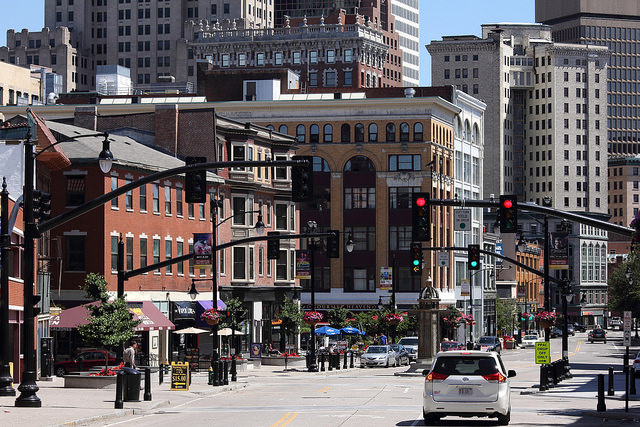 Providence, Rhode Island, courtesy of Flickr user saintseminole.
Providence, Rhode Island, courtesy of Flickr user saintseminole.
Megan: Yeah, I’ve never been there but I actually have an image of it just pretty but like pretty with city right next to it. I imagined as kind of a neat place and so if someone was marketing to people local to Providence, what do you think they would know? What do you think are some things about people who live in Providence that might be set them apart from people who lived in the cities?
David: I don’t know that I can comment on. I think it might be different when I came here but there’s a very specific culture in Rhode Island and Eastern Massachusetts. It’s interesting because it not my culture like I grow up with kind of New York city stuff and watching the local news here, it really is different like people are interested in different kinds of things.
I don’t know that I could like market people here I meet. We are very liberal. I just looked at the election results, I think Providence was like 80% for Clinton which I think is among the highest in the country but I don’t think that’s true.
Megan: Yeah. Well. It looks like a neat place to live anyways and one day, hopefully I will visit there.
David: Yeah.
Megan: Well, David thank you so much for being on The Zip. I really appreciate your time.
David: Yeah of course.
Megan: If so people want to follow you on Twitter or look at Street Fight, where would they go?
David: Sure, I guess I should go to Street Fight Twitter, which is @streetfightmag. I’m at just @davehirschman on Twitter and I guess sign up for Street Fight newsletter. That’s kind of our main kind of thing that we talked to the world with and that’s the daily newsletter of local marketing, commerce and tech headlines.
Megan: Yeah, I get that every day. I read through it and it has really some great articles in.
David: Yeah, thanks. I’ve done sort of newsletters for long time and we still, I mean, that’s kind of our strongest product if you like.
Megan: It’s pretty good. Well, David thank you so much and I hope you have a great weekend and just— yeah, I think we all need the weekend. So, have a good weekend.
David: Alright, thanks so much Megan.

